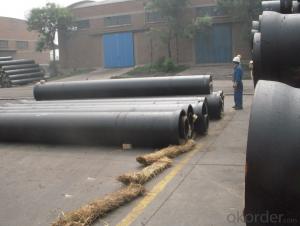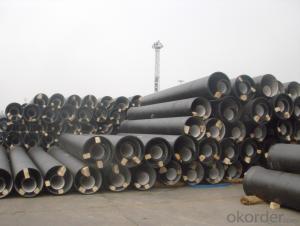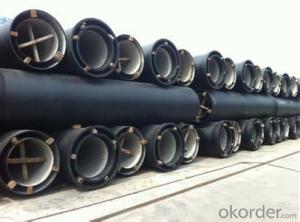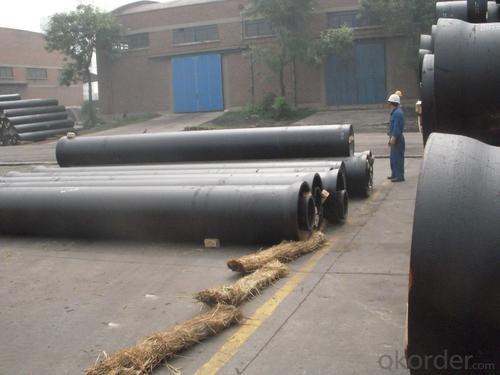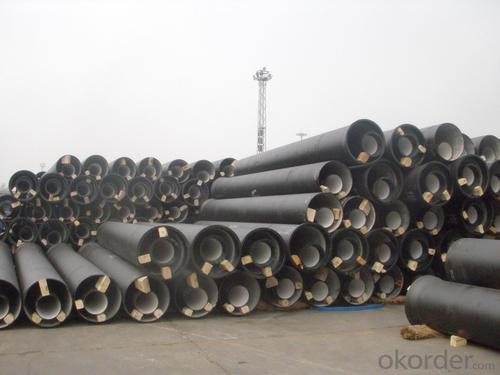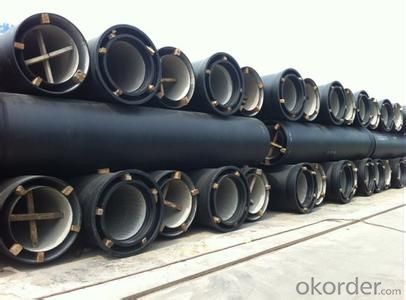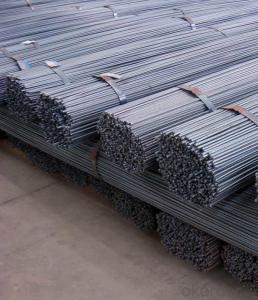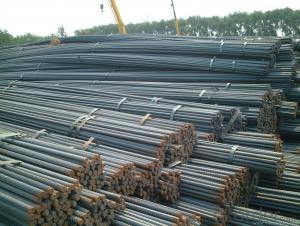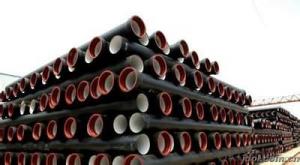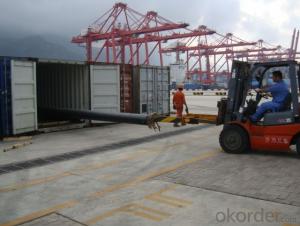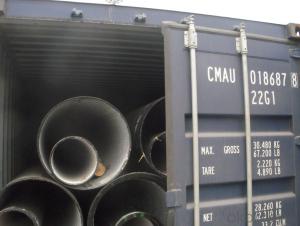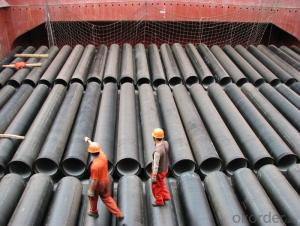DUCTILE IRON PIPES K9 DN80
- Loading Port:
- China Main Port
- Payment Terms:
- TT OR LC
- Min Order Qty:
- -
- Supply Capability:
- -
OKorder Service Pledge
OKorder Financial Service
You Might Also Like
Ductile Iron Cast Pipe is without any defects compare with tradition casting tech, which has many advantages particularly as follow:
(1) High density. In the "vertical upward casting" process, the melt iron of centre liquid column in center crystallizer is continuously feeding for volume shrinkage caused by condensation tube at outer circumference , which lead to be free of shrinkage porosity.
(2) High purity. When melt iron pouring, the mixed impurities such as gas, dross, sand grain which are lighter than melt iron could be eliminated at furnace mouth, its impossible to enter into the crystallizer through the channel, so the melt iron into the crystallizer is very pure.
(3) Strength with toughness. The cooling speed provided by continuous crystallizer is 30 times than sand casting and 5 times than centrifugal casting, and doesn't produce white iron, the eutectic cell volume of continuous cast iron is one eighth to one tenth compare with traditional cast iron. The density of graphite nodule in ductile iron can reach 300-700 pcs/mm2. Therefore, all reason above improve the strength and toughness of continuous cast iron.
(4) Free machining. The high speed cooling make the hardening phase (such as boride, steadite) not appear like reticular, massive or thick, but diffuse like fish bone and pane in shape, moreover, there are tiny graphite flakes inlaid hardening phase. It's free machining in BrinellHardness the range of 250-300HB. However, the Brinell Hardness of 250 is top limit to common metal materials.
(5) Uniform composition of tube wall. The convection mixing of liquid column caused by marching type drawing in crystallizer make the composition of tube wall well-distributed, and concentration gradient very little.
(6) High productivity. To the wall thickness of tube under 10mm, the speed of continuous casting is 1 meter/min, to the wall thickness of tube under 20mm, the speed of continuous casting is 0.5 meter/min, which is high efficiency that centrifugal or other casting tech couldn't reach.
- Q: What is the cost of ductile iron pipes compared to other materials?
- The cost of ductile iron pipes is generally higher compared to other materials such as PVC or HDPE. While the upfront cost may be higher, ductile iron pipes are known for their durability, longevity, and resistance to damage, making them a cost-effective choice in the long run.
- Q: Are ductile iron pipes suitable for installation in areas with high seismic activity?
- Yes, ductile iron pipes are suitable for installation in areas with high seismic activity. Ductile iron pipes have excellent strength and flexibility, allowing them to withstand ground movements caused by earthquakes. Their ability to absorb and distribute stress makes them a reliable choice for underground infrastructure in seismic-prone regions.
- Q: Are ductile iron pipes suitable for use in paper mills?
- Yes, ductile iron pipes are suitable for use in paper mills. Ductile iron pipes are known for their strength, durability, and corrosion resistance, making them ideal for handling various fluids, including those used in paper mills. Additionally, their ability to withstand high pressures and temperatures makes them reliable and long-lasting in the demanding operating conditions of a paper mill.
- Q: Can ductile iron pipes be used for trenchless pipe rehabilitation methods?
- Yes, ductile iron pipes can be used for trenchless pipe rehabilitation methods. Trenchless pipe rehabilitation methods involve repairing or rehabilitating existing pipelines without the need for extensive excavation or trenching. Ductile iron pipes are commonly used in these methods due to their durability, strength, and resistance to corrosion. They can be rehabilitated using various trenchless methods such as pipe lining, pipe bursting, and slip lining. These methods involve inserting a new lining or pipe inside the existing ductile iron pipe, thereby extending its lifespan and improving its structural integrity. Ductile iron pipes are preferred for trenchless rehabilitation as they can withstand the forces and pressures involved in the process while providing a long-lasting and reliable solution.
- Q: How much is the installation of cast iron pipe drainage 1 meters?
- From the tightness and corrosion resistance, ductile pipe sealing better after installation, but also can improve the corrosion resistance of corrosion protection through a variety of means; from the hydraulic performance, because ductile pipe specifications generally refers to the inner diameter of PE pipe diameter specifications generally refers to the same specifications, because under the condition of ductile pipe can achieve more runoff large; from the installation and maintenance cost, ductile pipe have more favorable price. The inner wall of zinc spray, anti-corrosion materials such as cement mortar.
- Q: Are ductile iron pipes suitable for bridge piers or abutments?
- Yes, ductile iron pipes are suitable for bridge piers or abutments. Ductile iron is a strong and durable material that is widely used in various infrastructure projects, including bridges. It has excellent mechanical properties, including high tensile strength and impact resistance, making it capable of withstanding heavy loads and external forces. Additionally, ductile iron pipes are highly resistant to corrosion and have a long service life, which is crucial for structures like bridge piers or abutments that are exposed to harsh environmental conditions. The versatility and reliability of ductile iron pipes make them a suitable choice for supporting and reinforcing bridge structures, ensuring their safety and longevity.
- Q: What is the difference between a cast iron pipe and a ductile iron pipe?
- The ball compressive strength of ductile iron pipe is much higher than that of cast iron pipes, buried in the ground, the car is not easy to be crushed.
- Q: Can ductile iron pipes be used in dam or reservoir projects?
- Yes, ductile iron pipes can be used in dam or reservoir projects. Ductile iron pipes are known for their strength, durability, and corrosion resistance, making them suitable for various applications, including water distribution and transmission systems. In dam or reservoir projects, where the pipes need to withstand high pressure and carry large volumes of water, ductile iron pipes are often preferred. They have excellent mechanical properties, including high tensile strength and impact resistance, which ensure their ability to handle the load and provide a reliable and long-lasting solution. Additionally, ductile iron pipes are also adaptable to various installation methods, including trenchless techniques, making them a versatile choice for dam or reservoir projects.
- Q: Can ductile iron pipe be used for stormwater systems?
- Yes, ductile iron pipe can be used for stormwater systems. It is a suitable material choice due to its strength, durability, and resistance to corrosion, making it capable of withstanding the demands of stormwater drainage systems.
- Q: Will the quality of ductile iron shrink?
- This is a ductile iron is prone to problems, manhole covers, large flat pieces, you have to see clearly, and some appear to be concave, not shrink, it may be caused by large gas emissions, not out
Send your message to us
DUCTILE IRON PIPES K9 DN80
- Loading Port:
- China Main Port
- Payment Terms:
- TT OR LC
- Min Order Qty:
- -
- Supply Capability:
- -
OKorder Service Pledge
OKorder Financial Service
Similar products
Hot products
Hot Searches
Related keywords
